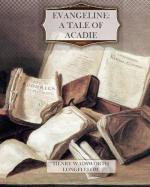1114. Fata Morgana (Fae-tae-Mor-gae’-nae,) mirage.
1139. Mowis (m[=o]’-w[=e]s.)
1167. Black robe chief, Jesuit priest at the head of the mission, so called because of his black robe.
1182. Susurrus, whisperings.
1219. Humble plant, a plant that grows on the prairies whose leaves point north and south, thus serving as a guide.
1241. Moravian missions. The Moravians are a Christian sect noted for their missionary zeal.
V.
1256. A number of streets in Philadelphia have the name of trees, as Walnut, Chestnut, etc.
1257. Dryads, Goddesses of the woods.
1288. Sister of mercy, a member of an order in the Roman Catholic church. The members devote their lives to works of charity.
1355. See Exodus XII, 22-23.
ARGUMENT.
“Evangeline” is usually studied in the seventh school year—a time when a somewhat intensive study of a piece of literature may be undertaken with profit. This poem offers a most delightful introduction into the wider realms of literature—an introduction fraught with much consequence since the manner of it is likely to have a considerable bearing on the pupil’s future in this subject. It is certainly important that the most be made of the opportunity.
We believe that the common lack of interest and effort in school work is often due to an absence of definite and visible ends, and of proper directions for the reaching of those ends. Pupils do not object to work, and hard work, with something tangible. What they do object to is groping in the dark for something that may turn up—which is too frequently the case in their study of a piece of literature. Such a course may be commendable later, but at this period, suggestion and direction are necessary. These are furnished by our “Suggestive Questions,” which indicate lines of study and research.
In the ordinary reading class the work is largely done by a few of the brighter pupils. It is quite difficult to secure a careful preparation by the whole class. It is also difficult to ascertain how well the pupils are prepared. The “Suggestive Questions” will be found very helpful here.
Care has been exercised in the division of the subject matter that each lesson may, in a sense, be complete in itself. The lessons are supposed to occupy twenty-five or thirty minutes; this, with the nature of the subject matter and the number of unfamiliar words, determining the length of the lessons.
The poem is to be studied twice:—
First, a general survey to get the story and the characters clearly in mind.
Second, a careful study of the text that the beauty and richness, the artistic and ethical values of the poem may be realized.




